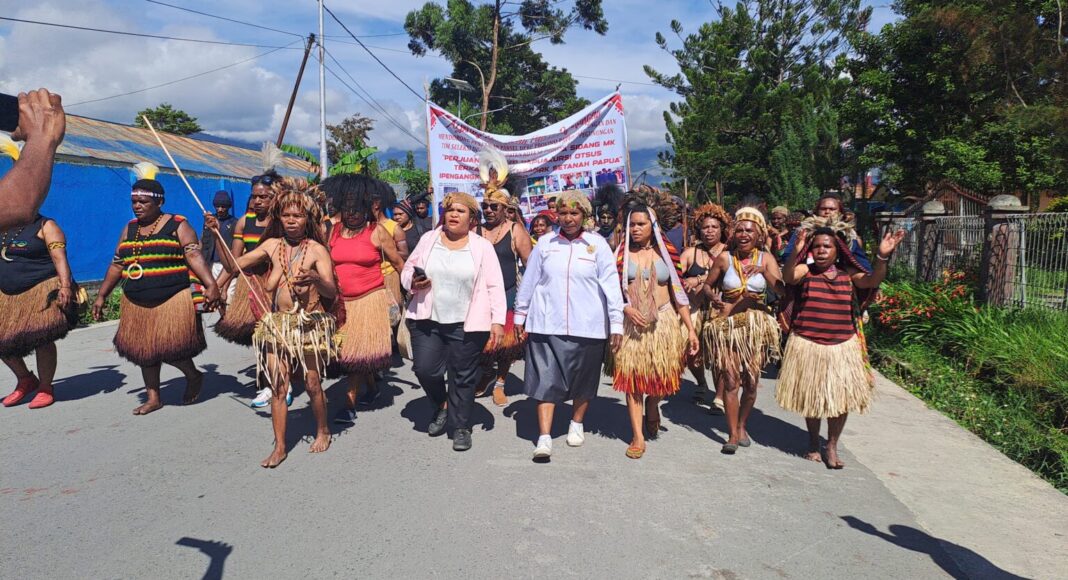The Women, Peace, and Security (WPS) agenda, established through United Nations Security Council Resolution 1325 in 2000, recognises the vital role of women in peacebuilding, conflict prevention, and security governance. As Papua, Indonesia’s easternmost region, grapples with decades of entrenched conflict, resource exploitation, and socio-political marginalisation, the WPS agenda emerges as a transformative framework. It holds immense potential to address gendered vulnerabilities whilst unlocking the peacebuilding potential of women, ensuring that human security is achieved for all.
Keywords : Women, Peace, Security, Gender
WPS Principles: A Framework for Change
The WPS agenda emphasises four pillars which are prevention, participation, protection, and relief/recovery. Applying these principles in Papua’s security landscape can foster a gender-sensitive approach to peacebuilding:
- Prevention: Addressing root causes of conflict, including gender-based violence and systemic inequality, through targeted interventions.
- Participation: Ensuring women are equitably represented in decision-making processes related to peace and security.
- Protection: Safeguarding women and girls from violence, including conflict-related sexual violence, and ensuring access to justice.
- Relief and Recovery: Integrating women’s needs and perspectives into post-conflict reconstruction and humanitarian efforts.
Papua’s Security in Complex Challenges
Papua has witnessed decades of tension stemming from issues such as contested governance, inequality, and resource extraction. This has resulted in sporadic violence, human rights violations, and displacement, disproportionately affecting vulnerable populations, including women and children. Women’s voices and experiences are often excluded from security discussions, exacerbating marginalisation and hindering effective conflict resolution.
Despite its potential to promote peace and security through a gender-inclusive approach, the Women, Peace, and Security (WPS) agenda faces a range of significant implementation barriers in Papua. These challenges include deeply entrenched cultural norms and patriarchal structures that limit women’s participation in decision-making processes at all levels. Additionally, the ongoing conflict and security instability in the region exacerbate the marginalisation of women, making it difficult for them to access opportunities for meaningful involvement in peacebuilding initiatives.
Another critical barrier is the lack of adequate resources and institutional support to implement WPS programs effectively, coupled with insufficient political will and commitment from local authorities. Limited awareness and understanding of the WPS framework amongst stakeholders, including government agencies and civil society organisations, further hinder its adoption and integration into regional policies. Moreover, logistical challenges such as poor infrastructure and geographical isolation make it difficult to reach affected communities, especially in remote areas, to ensure their active participation.
The persistent human rights violations and lack of accountability mechanisms also undermine trust in government initiatives, creating a challenging environment for implementing gender-sensitive peace and security measures. These combined factors highlight the urgent need for tailored approaches that address the unique sociopolitical and cultural dynamics of Papua to effectively advance the WPS agenda in the region.
Integrating the Women, Peace, and Security (WPS) Agenda into Papua’s Security Framework
Papua, Indonesia, faces a myriad of security challenges stemming from long-standing tensions, conflict-driven displacement, and human rights violations. These issues are exacerbated by socio-economic inequalities, marginalisation of indigenous communities, and limited access to justice. Whilst these conflicts impact all sectors of society, they disproportionately affect women, who often endure heightened violence and exclusion from critical decision-making processes.
Integrating the Women, Peace, and Security (WPS) agenda into Papua’s security framework offers a path toward addressing these challenges holistically. The WPS framework, anchored in United Nations Security Council Resolution 1325, emphasises the inclusion of women in peacebuilding, the protection of women and girls during conflicts, and the promotion of gender equality in recovery efforts.
The ASEAN Regional Plan of Action on Women, Peace, and Security (ASEAN RPA-WPS) provides a comprehensive framework for integrating gender perspectives into peace and security efforts across Southeast Asia. By aligning Papua’s strategies with this framework, the region can leverage regional support and expertise to address its unique challenges.
- Participation: Empowering Women in Peacebuilding
Women must be actively included in decision-making processes related to conflict resolution and peacebuilding.
- Strategies for Papua:
- Establish quotas or reserved seats for women in local peace councils and governance structures.
- Provide leadership training for Papuan women to enhance their capacity to participate in negotiations and community dialogues.
- Partner with civil society organisations, such as Suara Perempuan Papua, to amplify women’s voices and build grassroots movements.
ASEAN Alignment: The ASEAN RPA-WPS emphasises women’s leadership in peace processes, offering a model for institutionalising gender-inclusive governance in Papua.
- Protection: Safeguarding Women’s Rights in Conflict Zones
Protection mechanisms must be strengthened to address the unique vulnerabilities of women and girls in conflict settings.
- Strategies for Papua:
- Develop and enforce legal frameworks to prevent and respond to SGBV, including prosecution of perpetrators.
- Establish safe spaces and support services for survivors of violence, including trauma counselling and legal assistance.
- Collaborate with regional partners to deploy monitoring mechanisms for human rights violations.
ASEAN Alignment: The protection pillar of the ASEAN RPA-WPS underscores the importance of safeguarding women’s rights and ensuring accountability for violations.
- Prevention: Addressing Root Causes of Violence
Addressing the structural drivers of conflict, including gender inequalities and socio-economic disparities, is critical to long-term peace.
- Strategies for Papua:
- Invest in education and economic empowerment programs for women, particularly in indigenous and displaced communities.
- Promote community-based conflict prevention initiatives that integrate indigenous practices and gender-sensitive approaches.
- Conduct gender-sensitive conflict assessments to inform policy and programming.
ASEAN Alignment: ASEAN’s focus on prevention aligns with efforts to address systemic inequalities and build resilient communities in Papua.
- Relief and Recovery: Gender-Sensitive Post-Conflict Interventions
Post-conflict recovery efforts must prioritise the needs and contributions of women to ensure sustainable peace.
- Strategies for Papua:
- Include women in planning and implementing recovery programs, such as resettlement and livelihood restoration projects.
- Provide targeted support for female-headed households and widows, who are often amongst the most vulnerable.
- Foster reconciliation initiatives that acknowledge and address women’s experiences of conflict.
ASEAN Alignment: ASEAN’s emphasis on gender-sensitive relief and recovery provides a roadmap for integrating women’s perspectives into Papua’s post-conflict strategies.
Integrating the WPS agenda in Papua’s security landscape is not merely a matter of justice but a prerequisite for sustainable peace. In 2024, integrating gender-sensitive approaches can help address deep-rooted inequalities, empower marginalised voices, and create pathways for reconciliation and development. Whilst challenges remain, the resilience of Papuan women and the growing global momentum for the WPS agenda offer a beacon of hope. By centering women’s roles in peace and security, Papua can move closer to a future of equity, dignity, and lasting peace.








